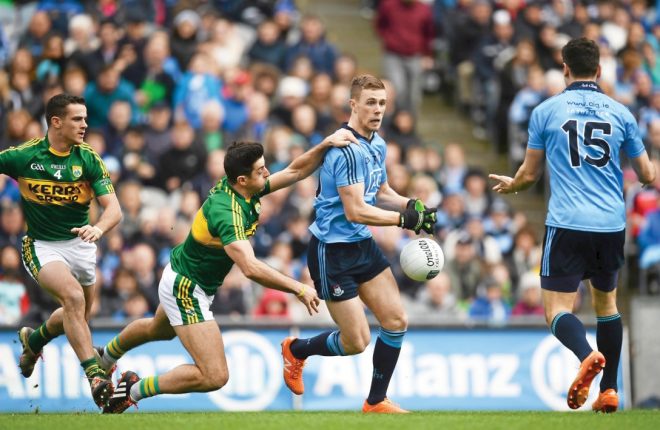
Dublin’s performance in the league final look like they won’t be caught this year
By John Hughes
One of the great things about the GAA is that it moves in cycles. Some move faster than others, but even the greatest team has to shuffle off into posterity sooner or later.
GAA history is littered with great teams who looked like they would rule forever. Kerry in the 1970s and 80s gave way to Meath and Cork. The Cork hurlers at the turn of the century looked immortal, right up until Brian Cody got the Kilkenny machine ticking to his satisfaction.
The Rebelettes have strode the stage like giants for more than a decade, but as their stalwart stars begin to exit stage left is it realistic to expect them to maintain that dominance in the face of so many hungry pretenders?
Kilkenny, like their amber and black comrades in Crossmaglen currently look like they are ordained to rule forever more.
But while it might seem unlikely to Orchard Gaels, the time will come when the Rangers will finally and definitively be toppled from their perch. The same will be the case for Kilkenny as their uniquely astute manager and his golden generation pass on to the RTE studios and other more sedate pursuits.
That ongoing changing of the guard means that every side can nurse the hope deep in their heart that some day, their day will come. That’s the beauty of tying players to parish and county, it helps stop competitions becoming stale.
While Leicester are breathing new life into the English Premiership, we have to acknowledge that what they have achieved this season is an anomaly of freakish proportions. We can talk about how changes in the distribution of Premiership cash have evened the playing pitch, but there is nothing that can ever totally counterbalance the financial clout of the Manchester Uniteds, Citys, Arsenals, Chelseas and Liverpools of this world.
The capacity to hoover up the best playing resources will always leave the financial have nots playing a losing battle against the haves in professional soccer.
I used to think GAA was immune to that sort of resource inertia. But watching Dublin’s demolition of Kerry on Sunday I’m no longer so sure. The Dublin story has been one of a juggernaut accumulating speed from the tenure of Pillar Caffrey onwards. The statistics over this decade bear testament to a side who now routinely rack up frightening scoring tallies. This is just a Dublin thing. They have just claimed their fourth National League title in a row. Decry the league if you want, but it remains the best arbiter of consistent excellence in our games.
Their championship defeats in recent times are notable for their exceptionality. Dublin have lost two meaningful games since 2010.
Their first against Mayo in 2012 saw them caught on the hop by the Westerners, while their second in 2014, came at the hands of one of the most gifted managerial geniuses of his age. A man who had to invest weeks of his life to identify how it might be possible to beard the lion in his Croke Park lair.
Kerry can bluff themselves they were in the league final until they went down to 14 men, but that would be to deny the reality that there was only going to be one winner last Sunday.
The Dublin phenomenon has some worrying features. As the country’s main urban centre and economic dynamo it is a magnet for young men. They might not end up playing for the boys in Blue, but it often deprives their home counties of their talents.
What the capital’s financial resources also allow it to do is hot-house their talent in a way other counties can only dream of. Comparing Dublin to Kerry on Sunday was like looking at two different specimens of humanity at times.
To beat Dublin you are going to have to match them for 70 minutes and given the remorseless fitness of the Blues squad it’s doubtful whether the best 20 players from the rest of Ireland would be able to do that. Yes, Dublin have put in a lot of work, and yes it’s great to see the GAA taking such a prominent place in the life of our capital.
But we can’t pretend that a substantial factor in their current hegemony is not attributable to the brute force of raw hard cash. While the ebb and flow of playing talent is an integral feature of the GAA, the worrying aspect about Dublin is that one of the key elements in their success isn’t just the DNA lottery. It comes down to a financial muscle which no other county in Ireland can compete with, or can ever hope to compete with.
This is a reality which, sooner or later, the GAA are going to have to come to grips with if All-Ireland championships aren’t to descend into endless Blue processions.
Receive quality journalism wherever you are, on any device. Keep up to date from the comfort of your own home with a digital subscription.
Any time | Any place | Anywhere











